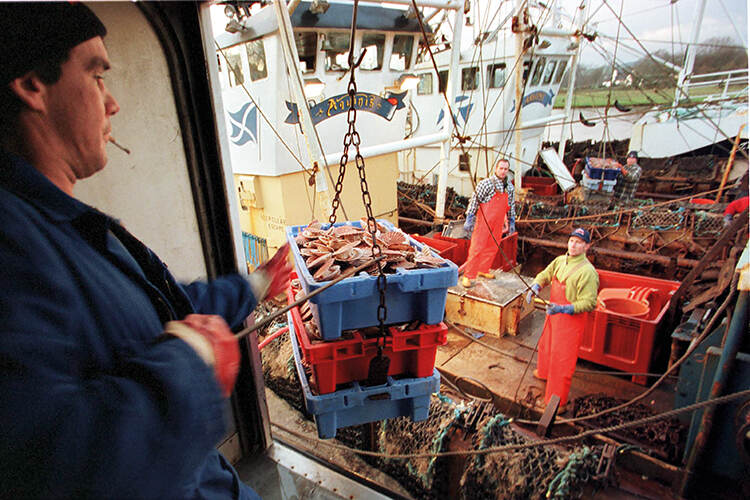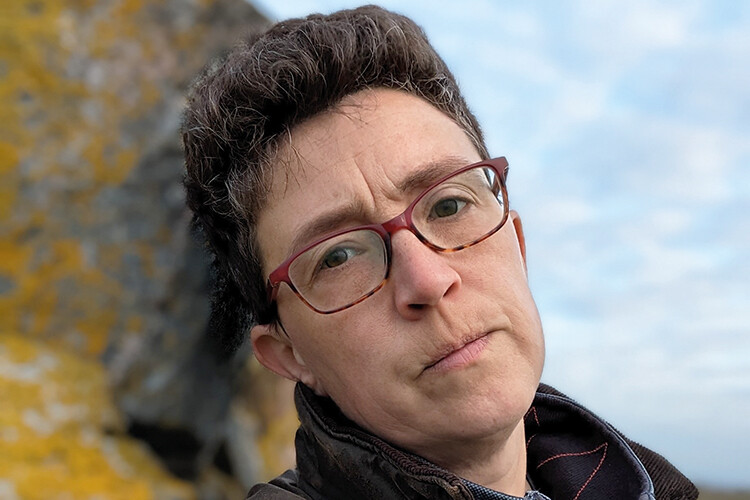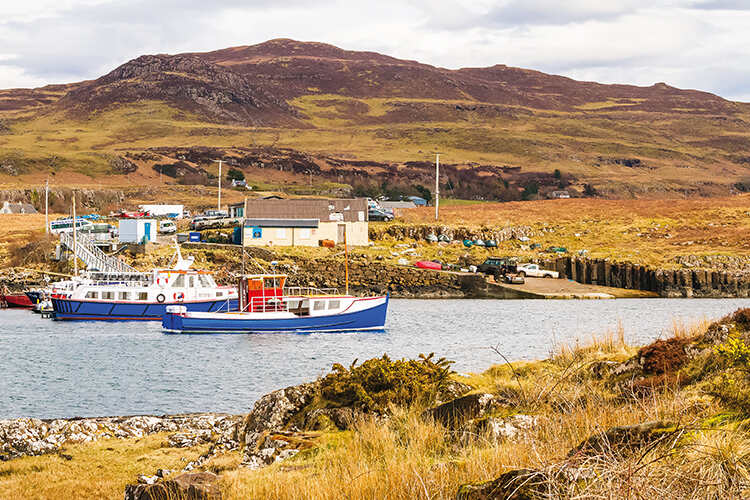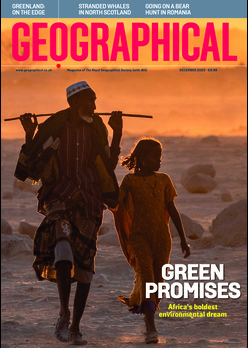
Heavy-handed plans to regulate ocean use in Scotland have been compared to the Highland Clearances of 200 years ago and have brought to a head festering grievances about how the Edinburgh-based Scottish government regards its island and Highland communities
Report by Mark Rowe
‘My song marks a fight for survival, a Mayday call we cry,’ sings Donald Francis MacNeil, a fisherman from Vatersay in the Outer Hebrides. ‘We will stand for the rights of our children; we will not let our islands die’. Invoking the Highland Clearances of the 18th and 19th centuries, the social ramifications of which still reverberate today, isn’t something MacNeil does lightly. Earlier this year, proposals to reform regulation of Scotland’s marine waters provoked a ferocious backlash from communities from the Mull of Kintyre on the west coast all the way north via the Outer and Inner Hebrides to Orkney and Shetland. The Scottish government was forced into a humiliating retreat, announcing in June that it was abandoning the plans.
Many islanders viewed the plans for a network of highly protected marine areas (HPMAs) as being as existential as the events of 200 years ago, when thousands of people were evicted from their land at gunpoint. The proposal may now be in tatters, but the whole affair picked at an open wound.
The emotive lyrics were written by MacNeil’s fellow fisherman Angus MacPhail, who also happens to be a founder member of the Scottish band Skipinnish. ‘These proposals cannot be allowed to go ahead,’ says MacPhail, who fishes out of Barra. ‘They must be opposed and sunk. They pose the biggest peacetime risk to our communities since the Highland Clearances.’
When the Scottish government announced plans for the HPMA network, it seems it had little idea of the reaction they would trigger among its coastal communities. The government’s aim was for at least ten per cent of Scottish waters to be designated as HPMAs, in which any fishing and aquaculture activity would be banned, by 2026. By setting aside such areas, the government argues, nature would be able to recover to a more natural state, allowing the wider ecosystem to thrive.

The reaction, from Shetland to Orkney and the Outer and Inner Hebrides was visceral. Critics say the HPMAs would drive fishing communities – many of which are struggling to remain viable – either to bankruptcy or to relocate, accelerating the wider trend of island depopulation. Not just trawler fishing but creels, inshore lobster and crab catching, shellfish processors, even tourism activities such as paddleboarding or boat trips, were threatened by quotas or outright bans, they feared.
For now, at least, that immediate fear has been paused. For while the net-zero secretary Mairi McAllan confirmed that HPMAs as proposed wouldn’t be pursued, she said the government was firmly committed to enhancing marine protection and that it would consult further with the industry, communities and conservation organisations about what she called ‘a new pathway and timetable.’
In reality, the fury was about much more than the HPMA proposals. For years, islanders have smouldered about what they see as a distant government in Edinburgh, home to tin-eared Central Belt politicians who have an idealised, metropolitan view of what Scotland’s islands should look like. In particular, the Gàidhealtachd – a term for the Scottish Gaelic-speaking culture of the Highlands and islands of Scotland – they conclude, is incomprehensible, impenetrable to those from the south. Briefings from within government that the islands’ response was pure hyperbole, the knee-jerk reaction of a Luddite fishing industry closing its ears to the climate crisis, simply entrenched positions.
‘It’s a textbook way to get everybody’s backs up,’ says Rhoda Meek, a crofter on Tiree. ‘In rural areas, people are increasingly fed up with not being listened to by Edinburgh, in the way that Scotland has felt it has not been heard by Westminster. We have housing issues, ferry problems, depopulation, broadband problems, crofting and now they are telling us to stop fishing.’
On all such issues, says Meek, locals have felt ignored, their concerns unheard. Decade-long complaints about ferry services and a botched commissioning of desperately needed vessels for Harris and North Uist have only belatedly received the national media attention that, had the problem occurred in the southeast of England, would have had a perma-presence in news bulletins. ‘You are seeing fury at HPMA proposals not because islanders and fisherfolk hate the environment but because our communities, language and culture are as fragile as our seas. No-one is saying they want to trash the seabed, or that better, cleaner seas are not a good thing.’
The ten per cent figure attached to HPMAs always sounded suspiciously neat, argued critics, leaving them to wonder if the aim was ‘a nice to have’ number to slip into soundbites. ‘The framework was put together without any consultation,’ adds Meek. ‘The government says they wanted to consult widely but the framework had already been established. They didn’t do the science.’
The Scottish government was adamant it wouldn’t budge and for several months, it doggedly stuck to its insistence that from 2026 all personal, commercial, non-commercial and recreational fishing would be banned in at least a tenth of Scottish waters, as would any activity that involves shellfish, anchoring a boat, hand-diving and gathering oysters and scallops from marine waters.
No-one denies that Scotland’s waters require better, more effective protection. Scotland’s 2020 Marine Assessment identified a ‘mixed picture’ of the state of Scotland’s seas, with marine mammals and commercial fish species improving but others, including seabirds and reef habitats, in disturbing decline. Ariane Burgess, MSP for Highlands & Islands and the Green party’s coastal spokesperson, said that ‘no take’ zones were a crucial step towards protecting coastal communities ‘and ensuring the sustainability of our fishing industries and marine life’. She described them as potentially ‘transformative for our coastal communities.’

Burgess is adamant that existing marine legislation, which she considers inadequate, must be beefed up. If HPMAs aren’t the answer in their most recent form, something has to be put in place. ‘We are trying to protect the seabed,’ she says. ‘Why? Because we want a sustainable fishery in 20, 30, 100 years’ time. People don’t understand what the situation is like in the sea.’
HPMAs were intended to augment the network of marine protected areas (MPAs) in Scottish waters. Although more than 250 regions are technically covered by MPAs, including sea caves, rocky shores and deep-sea habitats, the designation isn’t uniform and nature conservation and economic activity within them can vary. According to Burgess, all but two MPAs have evidence of what she calls ‘fishing effort’ inside them.
‘We do have marine protected areas, but they are protected in word only,’ she says. ‘They cover just 22 per cent of Scottish waters and fail to address what is known as shifting baseline syndrome,’ says Burgess, referring to the concept whereby the state of fisheries is rated against a chosen recent year, rather than historical dates, potentially leading to a misleadingly positive interpretation of long-term trends. ‘HPMAs were intended to give ecosystem wide protection, in contrast to MPAs, which address a single specific marine feature, such as maerl beds. Seabed damage is the key issue.’
Yet some of the genuine problems that need to be addressed, and which were used as a rationale for HPMAs, exasperate local communities. Burgess cites environmental concerns in Shetland, where the Scottish Environment Protection Agency has recorded damage to 80 per cent of the seabed. The majority of this, Burgess acknowledges, is down to bottom trawling, which isn’t carried out by local fishing vessels. ‘You could say the greater difference would be achieved by stopping huge Irish trawlers coming in and hoovering everything up,’ says Meek, pointing to the SMA 2020 report, which highlighted how ‘pressures associated
with bottom-contacting and pelagic fishing continue to be the most geographically widespread, direct pressures.’ ‘Our fishermen are incredibly sustainable,’ says Meek. ‘I’ve seen them notch the tails of any female breeding lobsters they catch, so if they are picked up by other fishermen, the lobsters get put back in the water. This is institutional memory, knowledge – it’s in their head.’
What many in the Highlands and islands perceive as a fundamental disconnect in Edinburgh risks undermining the very sort of sustainable economic activity the HPMAs were intended to support. Under the proposals, renewables activity was potentially subject to bans, something that Philip Coghill, advisory council member of the Scottish Crofting Federation, argues ‘will have knock-on effects for the environment’ and that speaks to a palpable lack of understanding of island communities and how they function. The Scottish government has long complained about how Westminster seems distant, doesn’t listen to it; many see a comparison with Holyrood itself and the islands. ‘When it comes to sustainability, crofting is low-impact, of high-nature value. Crofters know to give their land time to breathe with crop rotation methods. Any proposals should encourage sustainable use without damaging the fragile communities around them. This is just turning people against any protections when, in fact, everyone agrees we need to look after our seas.’
‘Crofting is often dismissed as the poor relation of intensive farming,’ says Theona Morrison from Grimsay in Uist, who is chair of Scottish Rural Action. ‘HPMAs would hit with a hammer the sustainable activities we need to support and completely overlooks the contribution that crofting and farming make to Scotland’s larder. Our fishermen leave the seabed knowing there will be a tomorrow for fishing for future generations.’

But island economics can be more tangled than the seaweed that’s harvested on the shore; few people on Scotland’s islands have just a single job. ‘The cultural legacy of crofting is what keeps people in communities even though those communities are fragile,’ says Morrison. Above all, crofting is central to island life, economy and culture and can, perhaps surprisingly to outsiders, be easily undermined by changes to fishing regulations. ‘Crofting is multi-dimensional, with different sources of income,’ says Coghill. ‘It’s not a full-time activity – many fishermen will have crofts. Fishermen can’t just go and get another job or expand their croft – the crofts risk becoming uneconomic. If you ban all activities in the sea, crofting will take a hit too, and crofting communities tend to be that bit more fragile. That would be devastating for communities and for young people looking to get crofts. And that in turn has implications for Gaelic as a spoken language.’
A suspicion prevails among local fishing communities that whatever measures or restrictions eventually become law, some larger players, such as the aquaculture industry, will be allowed to continue business as usual and offset any perceived damage caused by activities such as salmon farming, perhaps by purchasing permits that are beyond the means of small-scale or artisanal fisheries. Burgess says she hopes such a move ‘will not be allowed to play in’ and points to the support she gave to Orkney islanders to oppose salmon farm developments. She is sympathetic, she says, to small-scale fishing outfits, who ‘should be supported and protected under the United Nation’s Sustainable Development Goals’, to which the UK is committed. ‘This is about extractive activities,’ she says. ‘If people think paddleboarding is going to be targeted it shows just how this debate is misinformed,’ she says. ‘If you are paddleboarding, using a canoe or a boat to cross the water you are not damaging the seabed. Dropping an anchor can be damaging, but you can have a conversation and work that out.’
Fishermen do drop anchors. ‘Our fishermen [in Tiree] fish all around the island – in the south when the weather is better, in the north when it’s worse,’ says Meek. ‘What if suddenly there is an area of water they cannot fish in, that has been imposed from outside? The economic losses are incredible, it would affect everything.’ Many ripple effects, she says, feed into the ongoing erosion of things that underpin island communities. ‘Fishing families are the predominantly vernacular community. They have the culture, the language, songs and stories. These traditional practices are already on a knife-edge.
‘One fishing boat on Tiree employs three people and the income from it feeds 11 mouths and employs 20 people more widely,’ she continues. ‘If you cannot rely on that income any more then you, and other fishing families, move away, off the island. Losing 20 full-time jobs here would devastate us.’

Burgess denies the government is out of touch but admits that central government needs to consult better. ‘They need to be more accessible; more could be done to engage more people. I believe our fishermen really know the seas. Their knowledge is key to deciding where to protect. The whole idea of this was to encourage people to start thinking; it was never going to be dictated from Edinburgh. But there is absolutely a need to do something. There’s a great urgency to makes sure that fishing in Barra, Uist or the Small Isles has a future.’
On Vatersay, MacNeil is defiant. ‘Fishing has been my whole life,’ he says. ‘It supports my family and many in the community I have lived in since I was born. I know every reef, skerry and sandbank around these shores. For generations, we have fished responsibly, taken only what’s sustainable and made sure we do not damage the industry that puts food on my family’s table. To be told by officials in Edinburgh that they know better than those of us in the fishing community is frankly insulting.’
His song is perhaps a more powerful response to the proposals than any feedback form. ‘We have a long tradition of song in the islands but we tend to look at them in a historical context,’ says Morrison. ‘Very rarely do you see a contemporary song sung in protest by a community, but this has really resonated.’
Meek is relieved by the government climbdown on HPMAs but doesn’t see reason to celebrate, pointing to McAllan’s promise that any community that wished to pursue marine protection ‘on a quicker timescale… would be supported to pursue their plans’. ‘I’m glad that the government has seen sense, but the damage has been done,’ she says. ‘Coastal communities are rightly angry. Trust will need to be rebuilt long before marine-conservation conversations can begin. At a time when climate change, conservation and sustainability are increasingly important, and particularly so to coastal communities, this disgrace of a process is even more frustrating. Inshore fishing communities will be vigilant in continuing to protect their sustainable culture and livelihoods.’
Do politicians have a romanticised view of what Scottish islands should look like? ‘Even our policymakers see us as an area for tourism and recreation,’ Morrison says with a sigh. Meek, too, suspects that too many politicians have an idealised image based on summer breaks. ‘Tiree has lovely beaches. We could be right in the firing line for an HPMA or whatever else follows it; we could be a jewel in the crown for the sustainablity movement. The response [from government] is that HPMAs would have attracted more tourists. But there’s no point in Visit Scotland unthinkingly funnelling tourists to somewhere that looks superficially beautiful in summer to visitors if the things that underpin it have gone – no staff to work in shops or cafes, no local homes or schools. What are they expecting, that we have pop-up summer communities? It’s tragic.’




